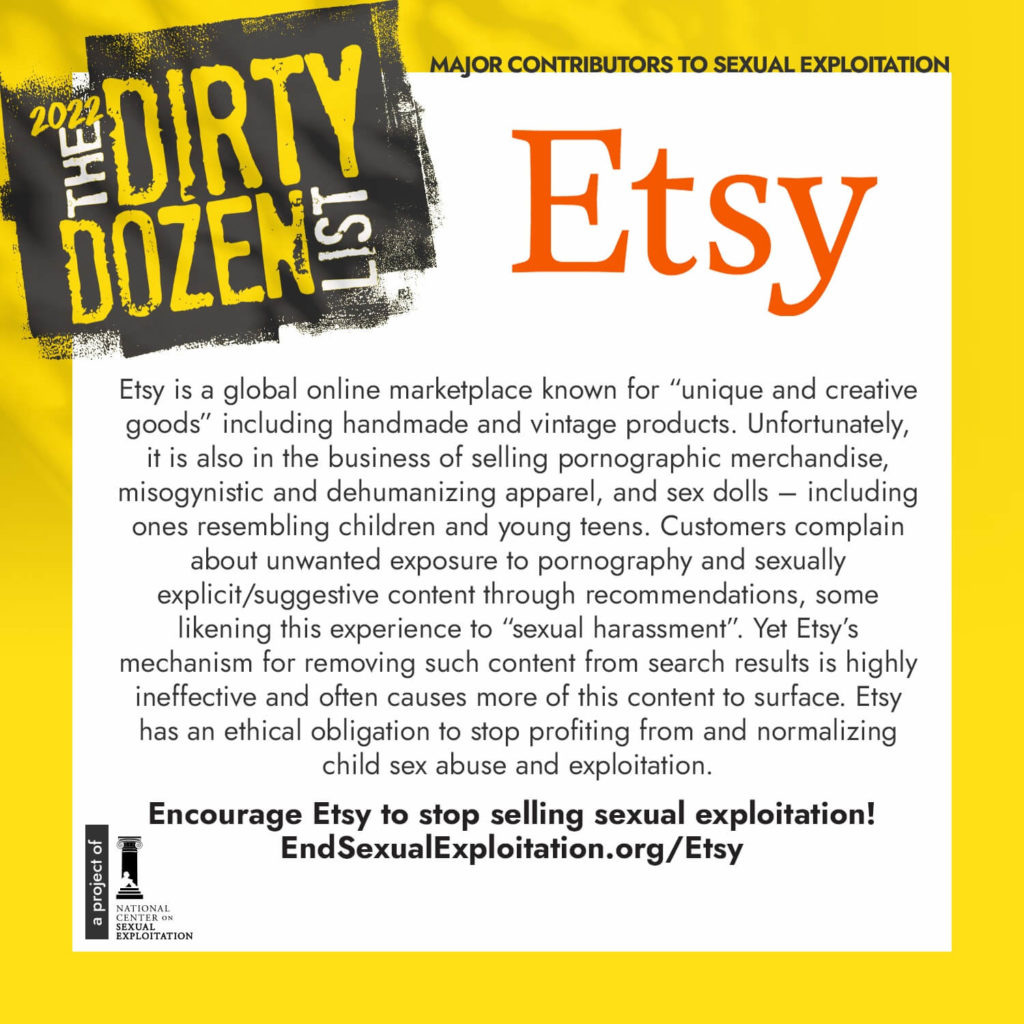What is Etsy?
Etsy is an online platform that connects “sellers”, typically those who manufacture their own products, to “buyers” interested in purchasing them. Etsy claims that its mission is to “keep human connection at the heart of commerce” and build “a place where creativity lives and thrives.” However, while millions worldwide may flock to Etsy for the chance to buy handcrafted goods and support small business owners, there is a dark side to Etsy and the kinds of products it offers.
Etsy sells an array of products that normalize sexual exploitation and abuse. Such products include sex dolls and misogynistic apparel which promote objectifying and degrading views toward women. Some of the sex dolls sold resemble minors, thereby normalizing child sexual abuse and encouraging pedophilia. Etsy further normalizes child sexual abuse by selling products used in “ageplay”—a fetish that involves the roleplaying of child sexual abuse. Pornography can also be found on Etsy, including “deepfake” pornography where a person’s face is edited onto a nude body without their consent. Etsy’s filters for pornography and sexually explicit content are woefully inadequate, resulting in users being traumatized by unsolicited exposure to this content.

Sex Dolls: Objectifying Women and Fueling Child Sexual Abuse
Etsy does not prohibit the sale of sex dolls, and as such the platform is littered with them. Sex dolls fuel sexual abuse and exploitation because of the way they fuel male sexual entitlement and female sexual objectification. According to Caitlin Roper, who is completing her PhD on the topic of sex dolls and sex robots, the vast majority of sex dolls owners are men and the vast majority of sex dolls are modelled on the bodies of women and girls. When men speak to their reasons for owning sex dolls, common themes that emerge are they like that the dolls “are always sexually available, that they allow men to have sex whenever and however they want, that they [the men] are calling all the shots, they don’t have to . . . .consider anyone else’s feelings or needs or humiliation or pain. . .”
Yet the implications of training men to view women and sexual relationships through this lens are catastrophic. As Dr. Maras and Dr. Shapiro note in the Journal of Internet Law, sex dolls “have the potential of altering individuals’ views and perceptions of relationships, ultimately, having them interact with humans as they would with the dolls and robots.” In other words, the use of sex dolls further reinforces the notion that women are nothing but sexual objects who exist solely for male sexual pleasure and whom men can use and abuse sexually however they please. This is precisely the mentality that lies at the heart of systemic sexual violence and exploitation.
To add insult to injury, some of the sex dolls on Etsy resemble minors, thereby fueling pedophilia and child sexual abuse. Some defend the use of childlike sex abuse dolls by arguing that they may provide people with a sexual interest in children an outlet and therefore prevent them from abusing living children. However, according to research from the Australian Institute of Criminology, there is no evidence in support of this notion. Ms. Roper explains that childlike sex abuse dolls do not serve as a substitute for the abuse of living children, but rather as a complement and an extension of it. They can also further increase the risk of child sexual abuse by presenting children as objects of sexual desire, reinforcing pedophilic tendencies, and desensitizing users to the harm children suffer from sexual abuse given that dolls do not give any emotional feedback.
Even more egregiously, there have been a couple horrific cases of Etsy sellers modeling sex dolls after real living children. For example, in 2020 one Etsy seller openly boasted that the sex doll he offered was modelled after a 14 year-old Instagram star. Collective Shout, a grassroots campaigns movement dedicated to ending the objectification of women and the sexualization of girls, contacted the seller of that doll and asked if he could model more after living children. They sent the seller computer-generated images of non-existing children who nonetheless looked real, and the seller agreed to model a doll after them. Ms. Roper, who is also the Collective Shout Campaign Manager, explains: “Men could see a girl out in public, take a photo and say, ‘I want a doll modelled on her’. . . It’s a new way [children] can be victimized and abused even without their knowledge and without their presence.”
When a mainstream news outlet contacted Etsy informing them that this seller was modeling sex dolls after living children, Etsy quickly deactivated the seller’s account. Yet for months prior Collective Shout had been alerting Etsy to the problem of childlike sex abuse dolls on their platform and Etsy did nothing. Collective Shout’s campaign against Etsy continues to this day and they have never received any response or acknowledgement from the company. This indicates that Etsy is willing to prioritize profits over children’s safety and that they will only act when mainstream media coverage threatens to damage their reputation, and therefore their pocketbook. Etsy does not have any language in their policies which expressly prohibits child sex dolls or sexual content depicting children. This stands in contrast to their industry peer Wish, another prominent online marketplace, which expressly bans “Sexual Content Including or Relating to Minors”.
Etsy must explicitly prohibit childlike sex abusedolls and take rigorous steps to keep them off its platform. But beyond that, they should ban sex dolls in general—not only because these dolls are inherently objectifying to women (which is reason enough in itself), but because it will be virtually impossible for Etsy to keep childlike sex abuse dolls off its platform if sex dolls in general are permitted. It is an observable pattern that anywhere the sale of sex dolls is permitted, some sellers will fashion dolls that resemble minors. It is very difficult to moderate and enforce against this happening. For example, even in cases where a seller only publicly advertises adult sex dolls, it is possible to privately contact them to request a childlike abuse doll. Collective Shout and the National Center on Sexual Exploitation have both conducted investigations where we reached out to Etsy sellers of adult sex dolls and asked for a childlike one, and some of the sellers were happy to comply.
Child Sexual Abuse Roleplay
Etsy also sells products which promote the role-playing of child sexual abuse. Such products can easily be found by searching the term “ageplay” or “ABDL” (Adult Baby Diaper Lover), which refers to sexual role-playing in which one partner pretends to be a child or baby. On Etsy, one can find pages upon pages of ageplay/ABDL merchandise such as adult-sized pacifiers, diaper changing pads, and onesies. Some of these products join ageplay with BDSM, and the result is a fantasy of both sexually and physically torturing children. For example, NCOSE found adult-sized baby boots with spikes lining the inner soles and “spiked lockable pacifiers” designed for gagging and choking the wearer. Many argue that such role-playing is acceptable so long as it is only enacted between adults. However, one has to question the disturbing implications and dangerous long-term consequences of encouraging countless adults to fantasize about sexually abusing children.
Misogynistic Merchandise, Pornography, and Image-based Sexual Abuse
On paper, Etsy prohibits items that “glorify hatred towards people or otherwise demean people based upon… gender”. However, misogynistic merchandise that fetishizes the degradation of women is rampant on Etsy. For example, we have found women’s apparel, lingerie, and tatoos sporting slogans such as “f**k me like I’m property” and “f**k me like you paid for me”, and which refer to the wearer by horrifically degrading names such as “c*mdumpster”, “f**ktoy”, “c*msl*t”, “sl*t”, “wh*re”, “owned”, “b*tch”, and more. These slogans promote the view that women are mere sexual objects owned by men whose purpose is to be degraded, humiliated, dominated, used, and abused, and who actually crave that treatment. Again, this abhorrent mindset is what underscores and enables so much of sexual exploitation and sexual violence. The New York Times recently published a compelling piece which explained how daily, normalized behaviours of misogyny and sexism are the building blocks for more extreme forms of violence and abuse against women.
Pornographic content can also be easily found on Etsy, despite the fact that it is prohibited in their policies. This content even includes “deepfake” pornography, where the images of celebrities faces were edited onto nude bodies. Deepfake pornography constitutes a form of image-based sexual abuse, as a person’s image is stolen and used in pornographic content about their consent. Victims of deepfake abuse have described feeling “violated”, “nauseated”, and “mortified”, recognizing that their friends, family members, and co-workers might see these images and not understand they are fake. Deepfake pornography has been “weaponized disproportionately against women, representing a new and degrading means of humiliation, harassment and abuse.”
Insufficient Filters Result in Unwanted Exposure to Pornography and Sexually Explicit/Suggestive Content
Numerous users have complained of Etsy’s algorithm serving them unsolicited pornography and sexually explicit/suggestive content. Some sellers have aptly described such experiences as a form of sexual harassment. For example, one Etsy user testifies:
“I never searched for ANYTHING even remotely sexual, illicit, in any way, yet my front page is full of naked women. There is even one pic of a woman’s butt and a man’s hand reaching out to touch it. I don’t want to see this. I am sorry, this is sexual harassment, imo.”
Another seller says:
“When these types of complaints pop up weekly, I wonder if the women of Etsy are aware of Etsy’s porn issue. Etsy is essentially our landlord. If our landlord was plastering unsolicited porn all over the windows and doors of our shop and passing out graphic images to customers browsing our shops, it would be considered sexual harassment at best.”
Other users have made similar complaints about Etsy’s algorithm serving them recommendations such as dildos, sex toys, and kink products when they had no desire to see these things.
Etsy recommends that users type “-mature” (minus mature) at the end of their search if they wish to filter out sexually explicit or sexually suggestive results. This is not only bizarrely un-intuitive, it’s also ineffective. We have tested this mechanism and found it to be sorely lacking. It not only fails to filter out sexually explicit/suggestive results, it actually causes such results to show up when they do not otherwise. For example, when we searched the word “daddy” on Etsy, only innocuous results were shown on the first page. When we searched “daddy -mature”, however, the first page was littered with sexually explicit/suggestive merchandise. Etsy’s filtering mechanism is therefore actively causing more harm to users.
We are calling on Etsy to remove all products which normalize sexual abuse and exploitation from its platforms. Sex dolls should be banned, as they are inherently objectifying to women and fuel sexual violence and exploitation, and as allowing sex dolls inevitably results in the sale of childlike sex abuse dolls, which fuels child sexual abuse. Other content which normalizes child sexual abuse, such as ageplay products, should also be prohibited. Etsy should do better to enforce policies it already has, such as its ban on pornography and merchandise that glorifies hatred or demeans others based on gender. It must explicitly ban image-based sexual abuse and deepfake pornography, where victims do not consent to the distribution of their image.
Etsy should develop efficacious filtering mechanisms, turned on by default, so that users intentionally opt-in to see sexually graphic content.
Finally, Etsy should update their reporting system so that individuals can report an offending shop and/or product without logging into an Etsy account.


